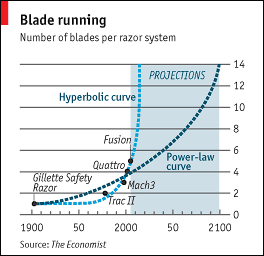I’m not sure HOW we got this totally backwards, but we have. Technology should serve humanity, not the other way around.
Archive | singularity
Other problems with the Singularity
Vastly extended human lifespans might sound like a great idea, but the death of art is only one.
Alltop IS the death of art.
Waiting for the razor-blade singularity
 We may need to check with Ray Kurzweil on this one, but it looks as though we might expect the technological singularity sooner than anyone expects, based on your razor.
We may need to check with Ray Kurzweil on this one, but it looks as though we might expect the technological singularity sooner than anyone expects, based on your razor.
The Economist did an evaluation of the number of blades on razors, and discovered (with five data points) that there is a Moore’s Law for razor blades. (This is the idea that computer chips double in power every 18 months or so.) It took seventy years to add the second blade, twenty or so to get to three blades, a few years to go from three to four, and the Fusion came out in 2006. So, is this just marketing, or another indicator of the technological singularity?
 I suspect the latter. Each new blade requires, like the the doubling of computer chip power, new technology and innovation. (Much to the chagrin of razor-blade marketers everywhere.)
I suspect the latter. Each new blade requires, like the the doubling of computer chip power, new technology and innovation. (Much to the chagrin of razor-blade marketers everywhere.)
The Economist predicts a 14-bladed razor by the year 2100, unless the growth rate is a hyperbola, in which case, expect the the singularity by 2015.
Unfortunately, we’ve been stalled at 5 blades for nearly 5 years now, so I suspect it is going to take longer to get that 14-bladed beard-destroying monster. My razor has five blades, and I find it takes too long to shave, though the results are acceptable. That said, I should also note that I have a goatee, so I’m only shaving 60% of my face. If I had to shave my entire face, I don’t know if I could take the crushing ennui.
Of course, by the time the singularity arrives, we’ll have an app for ennui.
Alltop uses the same bronze razor that Archimedes shaved with. Razor photo by Dr. Friendly.
When Roombas Attack: The Singularity
My next novel has a comedic take on the Technological Singularity, so I thought I’d start to do some more posts about the topic here on The Skwib. The following video is a kind-of companion piece for a Time article that came out earlier this year about the Singularity and one of its main proponents, Ray Kurzweil. It is presented by the Earth’s “premier science comedian”. I’m not sure what the hell that means, but it is funny!
The Frankenstein myth predates the story told by Mary Shelly, incidentally. A form of it is as old as Prometheus, in which the Titan steals the secrets of civilization and gives it to human beings. (Zeus doesn’t like this very much, and punishes Prometheus by forcing him to donate his liver to a large avian of the family accipitridae on a daily basis.) In Jewish folklore there is the golem, which is created from clay and in many accounts destroys its creator, largely because it’s so difficult to find a decent corned beef sandwich in medieval European cities.
In most of these stories, at heart is the idea of human hubris — an overweening pride or arrogance that defies the gods, or in modern stories, reality. Well, that and dodgy meals.
Hubris has always been a component of the human heart. Without it we wouldn’t try to create things, but if we rely on it too much, we can get ourselves in trouble. Most of our problems with technology stem from this irrational confidence that we can control our own creations — something that is manifestly untrue. If you ever get the feeling that our technology is out of control, you’re not alone. And you’re more sane than those who believe technology is something we command at will. It’s a bias we all have, because it’s rational.
We can control individual technologies, in the absence of other technologies and systems. But once they start to interact, they become more difficult to understand. The very rationality that allowed us to create science and technology in the first place now undercuts our ability to understand the gestalt of many technologies and systems interacting. That is not to say we shouldn’t TRY to understand them, but it is to say we should show more humility with the further creation of new technologies.
I will now demonstrate a complete lack of humility by inserting a cartoon of a monkey pirate. You didn’t see that coming did you?
Alltop is funnier than monkeys, pirates and robots combined.
Why are you feeling sad for the computer?

That’s assuming it’s even possible to download our “brains” — i.e., consciousnesses. Given the state of modern software, I sure wouldn’t want to trust my existence to the process. What if the download goes wrong? What if the server goes offline while I’m in the middle of the download?
What if I’m using WINDOWS?
It’s just to scary to contemplate.


